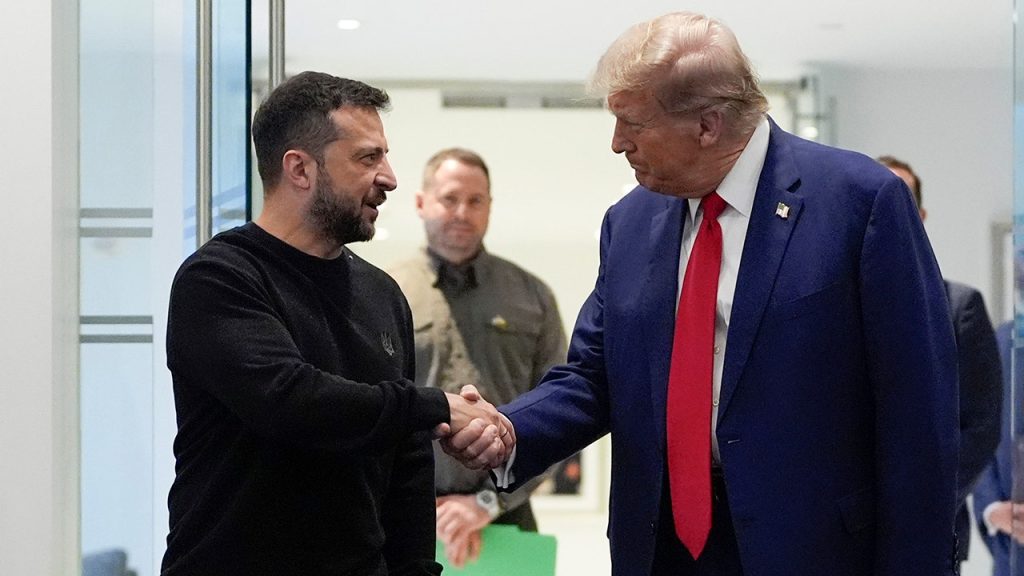Volodymyr Zelenskyy, the President of Ukraine, expressed optimism in a recent televised interview about the potential role of incoming US President Donald Trump in resolving the ongoing conflict with Russia. As the third anniversary of the Russian invasion looms, Zelenskyy highlighted Trump’s decisiveness as a key factor that could bring an end to the war. He suggested that Trump possesses the necessary qualities to influence Russian President Vladimir Putin and potentially facilitate a cessation of hostilities. Zelenskyy revealed that Trump had assured him of an early presidential visit to Ukraine following his inauguration, signaling a potential shift in US foreign policy priorities. This visit is seen as crucial for Ukraine’s efforts to stabilize the front lines and prevent further Russian advances in the new year. Zelenskyy also claimed that Putin is apprehensive about negotiations, fearing that engaging in peace talks would be perceived as an admission of defeat.
Despite nearly three years of intense fighting, Russia has failed to achieve its initial war aims and even the revised objectives announced by Putin last year, which focused on capturing the entire Donbas region in eastern Ukraine. However, the prospect of peace negotiations is not without its challenges for both sides. Zelenskyy, while welcoming the idea of talks, has emphasized that any negotiated settlement must include robust security guarantees for Ukraine, including the possibility of joining NATO. He underscored the importance of US involvement in these security guarantees, asserting that any agreement without American backing would be insufficient for Ukraine’s long-term security. He stressed the critical nature of Ukrainian independence, territorial integrity, and future stability, highlighting the need for strong international support.
Putin, on the other hand, has taken a firm stance against Ukraine’s NATO membership. He has stated his unwillingness to accept any ceasefire agreement that does not explicitly preclude Kyiv from joining the alliance. This presents a significant hurdle for peace negotiations, as NATO membership remains a cornerstone of Ukraine’s security strategy. Putin’s position reflects his concern about the implications of Article 5 of the NATO treaty, which stipulates that an attack on one member is considered an attack on all members. This collective defense mechanism would effectively guarantee a unified response from NATO nations should Russia launch another attack against Ukraine, a scenario that Putin clearly seeks to avoid.
Zelenskyy’s emphasis on US involvement in security guarantees reflects the crucial role the United States plays in the geopolitical landscape and its significance for Ukraine’s future. While he acknowledges the necessity of security assurances, he also underscores the importance of Ukraine’s sovereignty and independence in any potential agreement. This delicate balancing act highlights the complexity of the situation and the need for a nuanced approach to resolving the conflict. The divergent positions of Putin and Zelenskyy regarding NATO membership underscore the deep-seated mistrust and competing interests at play, making the path to a peaceful resolution fraught with obstacles.
The Ukrainian president, when questioned about his political future and the possibility of seeking re-election, reiterated that holding elections during wartime is constitutionally prohibited in Ukraine. However, he hinted at the possibility of considering another term once the conflict has concluded. He expressed uncertainty about the war’s eventual outcome and indicated that his decision regarding re-election would be contingent upon the circumstances at the time. For now, he emphasized that seeking another term is not his primary focus, but a decision that would be evaluated once peace is achieved and the nation can return to a state of normalcy.
This interview offers valuable insights into the complexities of the ongoing war in Ukraine and the delicate balance between the desire for peace and the need for robust security guarantees. Zelenskyy’s cautious optimism regarding Trump’s potential role in mediating the conflict, coupled with his firm stance on Ukraine’s security needs, reflects the intricate geopolitical landscape and the challenges in finding a lasting resolution. The contrasting positions of Zelenskyy and Putin on NATO membership highlight the deep-seated divisions that will need to be addressed in any future peace negotiations. The interview also underscores the uncertainty surrounding the future of Ukrainian politics, with Zelenskyy’s potential re-election bid contingent on the outcome of the war and the prevailing circumstances at the time.

